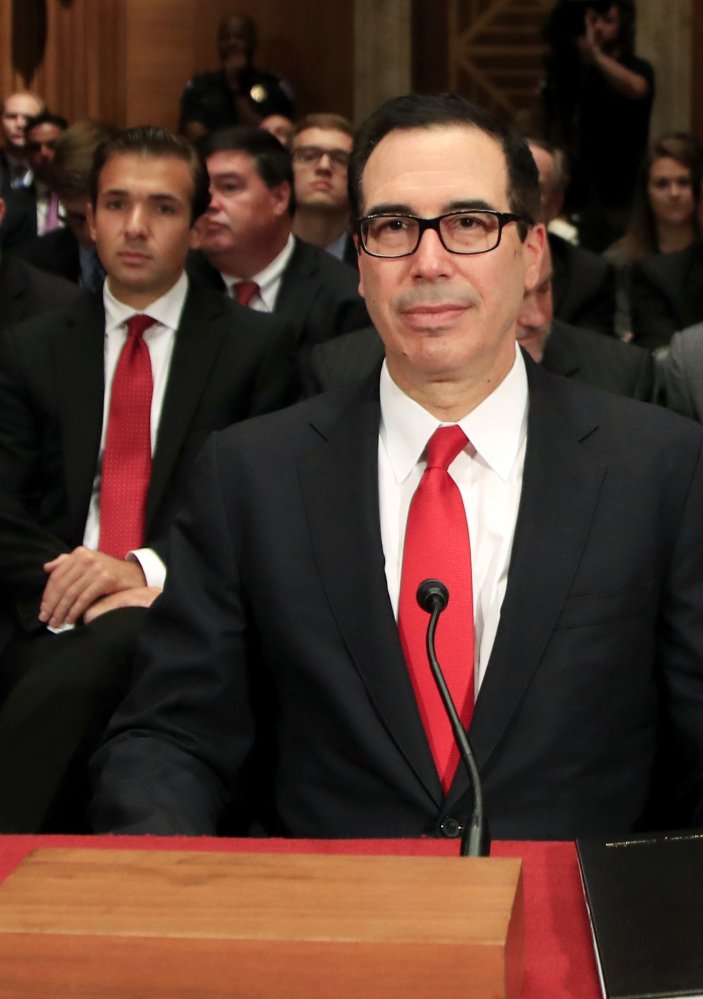Treasury Secretary Steven Mnuchin let on Thursday that the administration’s tax plan, which President Donald Trump was out selling, will arrive in the “next few weeks.” Hmm. The budget expires in a little more than four weeks. Do we really think an actual tax “reform” bill will be introduced, debated and voted upon (as part of budget reconciliation) when there will be nothing in hand for weeks?
Given the need to pass the debt ceiling, keep the government running and fund Harvey hurricane relief and the usual dysfunction we’ve come to expect from the White House and GOP Congress, I wouldn’t bet on tax reform getting done this year. And what about just a straight tax cut? We’ve argued that a big tax for the rich is economically unnecessary and politically untenable. Beyond that, however, is the issue of how to pay for it, a quaint notion in some quarters, but one that should be revisited.
The Committee for a Responsible Federal Budget argues, “It is more important now than ever that tax reform does not add to the debt. This means that every tax cut needs to be replaced with an equivalent offset that ensures that tax reform does not much our unsustainable fiscal situation even worse.” Several of CRFB’s reasons for opposing debt-creating tax legislation deserve consideration.
First, the damage from skyrocketing debt should deter debt-adding tax cuts. As a share of the economy, debt held by the public is currently 77 percent of Gross Domestic Product (GDP), which is higher than it’s been since the end of World War II and nearly twice the average of the last half-century. On its current path, debt will exceed the size of the economy by 2033 and exceed 150 percent of GDP by 2047. High and rising debt threatens economic and wage growth, the government’s ability to respond to new challenges, and the nation’s fiscal sustainability. Policymakers need to reduce the debt, not add to it.
Moreover, since the economy is humming along and unemployment is low, we’d argue that the harm from the debt increased by unpaid-for tax cuts outweighs any benefit we’d derive from the cuts. Given that this administration has no desire to produce entitlement reform and that we will need to pay for Harvey rebuilding, there’s no reason to ladle on even more debt.
Second, debt-creating tax plans don’t work all that well. (“In fact, the Joint Committee on Taxation estimated in 2011 that tax reform producing $600 billion of net revenue would produce about one-third more growth over the long run than revenue-neutral tax reform with the same structure.”) We would argue further that especially for corporate tax reform the benefit comes from simplification (flatter rates, less loopholes) that discourage unproductive business activity. You don’t need to tax businesses in the aggregate any less to achieve that objective.
Third, whatever you hear from the administration, remember that tax cuts do not pay for themselves:
While well-designed tax cuts can promote economic growth that leads to more revenue, there is no realistic scenario that this “dynamic revenue” will be as large as the initial tax cut. In order for a tax cut to pay for itself, it would need to grow the economy about $4 to $6 for every dollar of revenue loss. There is no historical case of a tax cut achieving this goal. Economic analysis has shown that tax cuts can only pay for themselves when the top federal rate is much higher than it is today — many economists believe the top rate would need to be above 60 percent. At best, the dynamic revenues from growth could pay for a fraction of the tax cut’s cost. Given our fiscal situation, tax cuts should be fully paid for without dynamic revenue so that the gains from economic growth can be used to address our mounting debt.
I’d add two more reasons to avoid a big, unpaid-for tax cut. First, that sort of tax plan entails a big, disproportionate tax cut for the rich. That’s not what Trump ran on, and it will increase all the problems (e.g. wealth inequality, cynicism about government) that fueled the Trump phenomenon to begin with. Second, to pass muster under reconciliation the tax cuts would have to be temporary, which makes no sense in the corporate tax realm and will revisit the sort of political standoff we faced with the George W. Bush tax cuts (on which Republicans relented, allowing tax cuts on upper-income individuals to expire). Aside from the political gridlock it creates this is no way to construct a tax system. Proceeding in this way simply increases what businesses and investors hate most — uncertainty.
Jennifer Rubin writes the Right Turn blog for The Washington Post, offering reported opinion from a conservative perspective.
Send questions/comments to the editors.



Success. Please wait for the page to reload. If the page does not reload within 5 seconds, please refresh the page.
Enter your email and password to access comments.
Hi, to comment on stories you must . This profile is in addition to your subscription and website login.
Already have a commenting profile? .
Invalid username/password.
Please check your email to confirm and complete your registration.
Only subscribers are eligible to post comments. Please subscribe or login first for digital access. Here’s why.
Use the form below to reset your password. When you've submitted your account email, we will send an email with a reset code.